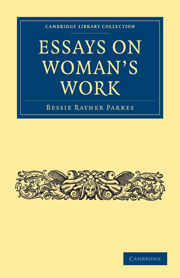VII - CO-OPERATION
Published online by Cambridge University Press: 05 July 2011
Summary
SOME of the difficulties likely to hinder women from entering successfully into business may be much lessened by the application of the principles of co-operation. If the strain of competition be productive of evil to workers of the stronger sex, causing an over-tax of health, strength, and energy, tempting to late hours, and daring speculation, we may reasonably regard the business career of women as more likely to be injured by the same causes, and regard the new and fertile principle which has already created some very flourishing enterprises in retail trade, with a hopeful eye.
Believing that it may be turned to excellent account by industrious women, let us begin at the beginning, and define, in the simplest words, what co-operation is; premising that, among political economists, John Stuart Mill stands pre-eminent as its apostle, and that the principle, for the sake of which he perhaps in former years slightly damaged his scientific reputation among men of a narrower school, may now, having fought its way year by year, through some failure and a few disgraces, be considered fairly established.
Co-operation, in the commercial sense, implies an application of the joint-stock principle; that the money with which a concern—say a grocer's shop, or a tailor's business, or even a factory—is carried on, has been clubbed together by different people, who appoint a manager and share the profits. This is what we usually mean by co-operation in trade, and it is not true and real unless the shares are actually shares owned by different hands.
Information
- Type
- Chapter
- Information
- Essays on Woman's Work , pp. 165 - 182Publisher: Cambridge University PressPrint publication year: 2010First published in: 1865
